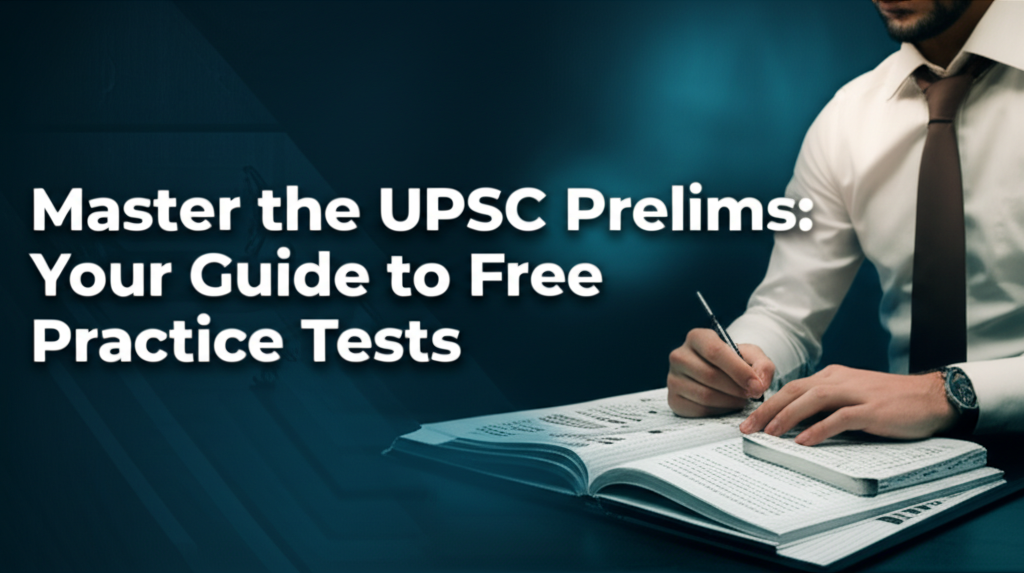The Union Public Service Commission (UPSC) Civil Services Examination is considered one of the toughest competitive exams globally, especially in India. It’s the gateway to prestigious services like the Indian Administrative Service (IAS), Indian Foreign Service (IFS), and Indian Police Service (IPS), among others. With many students and professionals in the USA looking to expand their horizons by taking this esteemed exam, mastering the UPSC Prelims is essential for success. This article serves as a comprehensive guide to using free practice tests and resources effectively.
Understanding the UPSC Prelims
The UPSC Prelims consist of two papers: General Studies Paper I and General Studies Paper II (CSAT). The General Studies Paper I covers a wide range of topics including history, geography, polity, economy, environment, and current affairs. The General Studies Paper II, or CSAT, tests candidates on comprehension, interpersonal skills, logical reasoning, analytical ability, decision-making, and basic numeracy.
Format of the Exam
- Total Marks: 400 (200 marks for each paper)
- Duration: 2 hours for each paper
- Negative Marking: Yes, 1/3rd mark is deducted for every incorrect answer.
Relevance of Practice Tests
Mock tests are invaluable in preparing for the UPSC Prelims. They help candidates assess their knowledge, improve time management skills, and familiarize themselves with the exam format.
Why Use Free Practice Tests?
- Cost-Effective: With many students in the USA often balancing tuition or living expenses, free resources are crucial.
- Variety of Questions: Free online tests provide diverse questions that can cover the vast syllabus effectively.
- Immediate Feedback: Users can quickly assess their performance, helping to identify strengths and weaknesses.
The Best Free Online Practice Test Platforms
Here’s a research-backed analysis of several popular platforms offering free UPSC Prelims practice tests, along with authentic user experiences and reviews.
1. Unacademy
Overview: Unacademy is one of India’s leading online learning platforms that offers a range of free resources, including practice tests for UPSC aspirants.
- Features: Daily quizzes, test series, and interactive lessons.
- User Experience:
- Review: “Unacademy’s practice tests helped me cover areas I hadn’t thought to focus on. The timely feedback helped me understand where to devote more hours.” – John, UCLA Graduate
2. BYJU’S
Overview: Another popular platform in India, BYJU’S provides free practice tests specifically tailored for the UPSC Prelims.
- Features: Video lessons, mock tests, and study guides.
- User Experience:
- Review: “I found the BYJU’S interface user-friendly, and the explanations for the answers were concise and clear. Great resource!” – Emma, Stanford Student
3. Insights on India
Overview: This website is focused squarely on civil services preparation, offering daily quizzes and a significant amount of resources.
- Features: Test series, preparation material, and community discussions.
- User Experience:
- Review: “The community discussions on Insights helped clarify my doubts. The free mock tests were just what I needed.” – Rahul, NYU Graduate
4. Civilsdaily
Overview: Civilsdaily offers a range of mock tests and preparation schemes.
- Features: Daily news analysis and integrated test series.
- User Experience:
- Review: “Civilsdaily’s focus on current affairs helped me stay updated with the world while prepping!” – Sara, Harvard Student
5. Testbook
Overview: Testbook has carved a niche for itself by providing a dedicated section for UPSC preparation.
- Features: Free mock tests and comprehensive performance analysis.
- User Experience:
- Review: “Testbook’s performance analytics really showed me where I lagged. It’s a well-thought-out platform!” – Liam, University of Chicago
Strategies for Effective Test Preparation
1. Create a Study Schedule
Creating a disciplined schedule is vital. Allocate specific time slots for each subject based on your strengths and weaknesses. Ensure a balanced approach that incorporates all subjects while leaving space for regular revisions and practice tests.
2. Understand the Syllabus Thoroughly
The UPSC syllabus is expansive and nuanced. Have a well-drafted breakdown of topics and subtopics and ensure that you align your practice tests with these areas.
3. Engage with Current Affairs
Current affairs play a significant role in the exam. Spend time daily reading newspapers or relevant online news sources. This practice can be directly linked with the general studies paper.
4. Regular Mock Testing
Include mock tests in your weekly schedule. Start with one or two tests a week and gradually increase the frequency. Post-test analyses are crucial: reflect on your performance, identify areas of improvement, and modify your study plan accordingly.
5. Join Study Groups
Form a study group with fellow aspirants. Being part of a community can provide motivation, foster discussions, and give insights that might not be available in isolation.
6. Focus on Time Management
During your practice tests, practice answering questions in a limited amount of time. This will help you mentally prepare for the exam, reducing anxiety about timing.
7. Analyze Your Test Results
After every mock test, analyze not just the questions you got wrong, but also the correct answers. Why did you choose the right options for some questions and continue misunderstanding others? This reflection can be pivotal.
8. Healthy Lifestyle Choices
A healthy body fosters a healthy mind. Regular exercise, good nutrition, and adequate sleep can significantly impact your ability to study and retain information.
Real-Life Stories: Students Who Conquered the UPSC
John’s Journey
John, a graduate from UCLA, discovered his passion for public service during his college years. Striving to clear the UPSC Prelims while working part-time, he relied heavily on platforms like Unacademy and Civilsdaily, utilizing their free mock tests to gauge his progress effectively.
Key Takeaway: “Persistence is key. I managed my time by taking bite-sized lessons and regularly testing my knowledge. The feedback made a world of difference — the values and experiences I learned from the process were life-changing.”
Emily’s Transformation
Emily, enrolled in a master’s program at Stanford, decided to attempt the UPSC after being inspired by Indian civil services officers she met during internships. She strategized to use practice tests from BYJU’S and Testbook, focusing on her weak segments while ensuring she remained well-versed with current affairs.
Key Takeaway: “It’s more than about getting the answers right; it’s about the journey of self-discovery. I realized my capabilities increased over time, and my confidence blossomed.”
Samar’s Insights
Samar, a recent NYU graduate, tackled the exam after a year of diligent preparation. He had a structured study plan and underlined critical information, using Insights on India for quizzes. He targeted specific current affairs events, and his preparation strategy saw him ahead of many of his friends who focused solely on standard textbooks.
Key Takeaway: “The key was embedding current affairs into daily learning. The integration of real-world issues with standard curricula made the whole process engaging.”
Conclusion
Mastering the UPSC Prelims may seem daunting, especially from abroad, but with the right resources, strategies, and dedication, success is within reach.
By utilizing free practice tests effectively, maintaining a structured study plan, analyzing past performances, and staying updated with current affairs, aspirants can significantly enhance their chances of success on this challenging journey.
Remember, every successful aspirant you come across today was once in your shoes — persevering, questioning, and striving for excellence. Utilize this guide, incorporate feedback, and embark on your training, equipped with the knowledge and tactics necessary for success. Best of luck!

